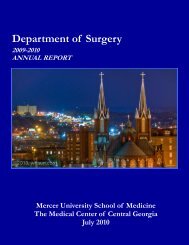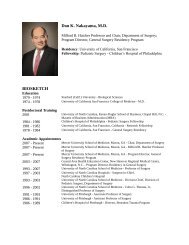Annual Report 09 - MCCG General Surgery Residency
Annual Report 09 - MCCG General Surgery Residency
Annual Report 09 - MCCG General Surgery Residency
Create successful ePaper yourself
Turn your PDF publications into a flip-book with our unique Google optimized e-Paper software.
We continue to tighten our academic coursework for the residency. We established an Education Group that<br />
meets monthly to review progress of the residency educational program. Martin L. Dalton, M.D., Professor<br />
and Chair Emeritus, and William K. Thompson, M.D., Associate Professor and Associate Chair for<br />
Surgical Education organized with the chief residents a comprehensive curriculum covering all topics of basic<br />
science and clinical topics in surgery. Weekly didactic lectures, reading assignments, and question and answer<br />
sessions form the core educational program. Case management conferences review cases in an oral<br />
board examination format. Specific objectives for all of the principal components of general surgery are<br />
spelled out for each post graduate year level, making clear the expected knowledge base, clinical skills, and<br />
management abilities.<br />
Our objective for clinical surgical skills is to have all<br />
residents exceed the numbers of operations in all<br />
defined categories of the RRC in <strong>Surgery</strong>. Two residents<br />
in the 2008-20<strong>09</strong> class did not reach previous<br />
levels of 1,000 to 1,200 operations during their residency<br />
even though they exceeded RRC requirements.<br />
We feel that there is no substitute for surgical<br />
operations in training, so we moved to augment<br />
the residents’ operative experience by expanding<br />
resident team “A” with the addition of Ellis Evans,<br />
M.D., Clinical Professor, and Brown Ekeledo,<br />
M.D., Clinical Assistant Professor, both active and<br />
respected surgeons on staff at <strong>MCCG</strong>. Written critiques<br />
of technical performance will confirm that<br />
the resident is making true progress toward proficiency<br />
in addition to the raw numbers of cases.<br />
Groundwork for a simulation laboratory to support all aspects of medical education at <strong>MCCG</strong> was initiated<br />
in 20<strong>09</strong> with the support of hospital administration and lead by Dr Thompson. The laboratory will include<br />
high fidelity simulators for surgical and endoscopic operations and critical care scenarios, as well as basic<br />
dummies and practice manikins. The proposed laboratory will also have necessary video support to review<br />
performance. Team training for<br />
trauma, emergency and critical care will<br />
also be a priority of the simulation<br />
laboratory.<br />
We enter the second year of an educational<br />
portfolio to document progress<br />
toward mastery of the six ACGME<br />
core competencies: patient care, medical<br />
knowledge, practice-based learning<br />
and improvement, communication,<br />
professionalism and system-based<br />
practice. Specific objectives for each<br />
core competency and the associated<br />
required skills for each have been delineated<br />
to allow progress to be documented.<br />
15
















